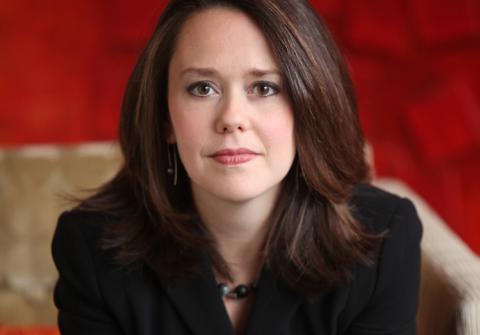Alumna Kelly Corcoran at the Intersection of New Music and Community Engagement

Alumna Kelly Corcoran is the founder and artistic director of Intersection, a contemporary music ensemble with an emphasis on social justice, racial equity, and cross-cultural engagement, based in Nashville, Tennessee.
Photo courtesy of Kelly Corcoran
What does a career in classical music look like in 2018? For alumna Kelly Corcoran (B.M. '99, voice), it means pursuing unexpected paths, having both an entrepreneurial and community engagement inclination, and continually asking how one’s work is relevant to the world today. This approach has made for a rich and varied career for the Springfield, Massachusetts native—from conducting the Nashville Symphony, to traveling around the world with the National Geographic Symphony, to spearheading a number of impactful community and music education initiatives.
Corcoran, who returned to the Conservatory twice this spring to conduct both the Conservatory’s contemporary classical music ensemble, contraBAND, and the Boston Conservatory Wind Ensemble, is the founder and artistic director of Intersection, a contemporary music ensemble based in Nashville, Tennessee. With an emphasis on social justice, racial equity, and cross-cultural engagement, Intersection was born out of her desire to use music as a tool to positively impact her community and make classical music accessible to all. “As someone who didn't come from a family that engaged much with classical music,” Corcoran explains, “I always felt a desire to make this music meaningful and accessible to people who might not have a previous relationship with it.”
Corcoran’s zeal for exploring diverse creative outlets flourished during her time at the Conservatory. Although she graduated from the school with a B.M. in voice, Corcoran began gravitating towards conducting in her junior year. She cites the Conservatory’s environment—a small, multiarts community where she felt free explore paths outside of voice—as critical to discovering this passion. “I took courses outside my major, like tap and string techniques, because I was hungry for all the resources the Conservatory had to offer. I honestly don’t think I would have gotten this anywhere else,” she says.
While studying voice under Sara Goldstein, she took private conducting lessons on campus and first stepped onto the podium to conduct a Boston Conservatory Orchestra rehearsal. Corcoran, who has “always had an inclination to engage with [her] community,” says that the communal aspect of working with an ensemble is what drew her to conducting. “As conductor, you rely on your colleagues, the musicians, to help create a shared vision. As the one who is leading that process, you’re hopefully creating an environment where people can feel engaged as part of this organism. Conducting is really a microcosm of being an individual within a larger social setting,” she notes.
With this community-minded spirit, it comes as no surprise that she thrived in the Conservatory’s unique social and cultural setting. Corcoran recalls being continually inspired by both the range of artists from the school’s three divisions and residing steps away from Symphony Hall, the home of the world-class Boston Symphony Orchestra, with whom she later performed as part of the renowned Tanglewood Chorus. “As a girl from Western Massachusetts, I had never had exposure to an orchestra like that before, she says. “Being on stage with the Boston Symphony Orchestra was life changing.” She further explains that having “access to the resources of Boston and the Conservatory’s supportive, cross-disciplinary environment” was key to putting her on a dynamic career path.
Although Corcoran maintains a strong affection for Boston and her Massachusetts roots, in recent years, she has made a deep impact on Nashville’s classical and contemporary classical scene. Prior to founding Intersection, she spent nine years with the Nashville Symphony, both as associate conductor and as director of the Symphony Chorus. Corcoran also founded the Nashville Philharmonic Orchestra, and, in 2015, was named Best Classical Conductor by the Nashville Scene.
Her tenure at the Nashville Symphony cemented her passion for contemporary music and collaborating with living composers. “As a conductor, one of the greatest things you can do is find a composer and champion their works,” she says. Among those composers is Conservatory Chair of Composition, Contemporary Music, and Core Studies Jonathan Bailey Holland, who was commissioned by Corcoran and Intersection to create I Too Sing, a new work that explores issues of race and youth, which premiered in January in Nashville. Corcoran’s advice for aspiring conductors is “to find composers that you believe in and whose music speaks to you, and champion that music. They need you and you need them.”
Corcoran is proud of the Conservatory’s commitment to training students in contemporary music, which, she notes, “they can’t get everywhere.” And for Corcoran, embracing new music goes hand in hand with the civic aspect of her work. “I came from a family, school, and community where service was valued and a responsibility—and that has carried into my work as an artist,” says Corcoran. “Every time I’m putting together a concert, I ask, “How does my work connect? Why does this matter?”
